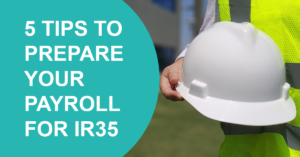IR35 is changing in April 2021. To avoid paying tax arrears and a possible penalty it’s essential that your employees and contractors are compliant. Here we explain what payroll managers need to be aware of to prepare for the IR35 reform.
IR35 was first introduced in 2000 to regulate individuals providing services via a limited company (Ltd Co.). New ‘off-payroll’ rules were then implemented in April 2017 for the public sector organisations, which switched the responsibility of determining a contractor’s IR35 status from the contractor themselves to the engager.
Initially due to roll out in April 2020, these same off-payroll working rules will now be extended to private sector businesses from April 2021, which will impact UK-based limited company contractors.
It’s imperative that your business is compliant with these reforms; if you are found to be within IR35 following an HMRC enquiry you will have to pay the tax and contributions owed. If the circumstances of your case show that you didn’t exercise reasonable care in completing your tax and National Insurance contributions returns you may also have to pay a penalty.
What can your business do to prepare for IR35?
There are a number of things you can do to prepare for these changes and the first is to check whether IR35 is applicable to your employees, clients or contractors, to avoid losing access to valuable skills and client projects respectively. It is important that employers are clear on what factors need to be considered when assessing if IR35 is applicable.
Conduct a full audit of all your employees, clients and contractors to determine who falls inside and outside of the new rules. You can check employment status using the HMRC (CEST) tool.
Exclusion for small employers
- Turnover of not more than £10.2 million
- Balance sheet total of not more than £5.1 million
- Number of employees not more than 50
Considerations for payroll
Apprenticeship levy
Where the rules apply the fee-payer will be treated as an employer for income tax, NIC and Apprenticeship Levy purposes.
Employment Allowance
All employer NICs paid as a result of deemed employment income are excluded liabilities for the purposes of the employment allowance. If there is a mix of employees and off-payroll workers, only the secondary class 1 NICs liabilities arising from payments of earnings made to the direct employees would be qualifying liabilities for Employment Allowance purposes.
Full Payment Submission (FPS)
Payroll software has been updated to include an indicator that will identify the off-payroll workers, therefore HMRC will no longer issue prompts for student loan deductions.
Corrections
If a Status Determination Statement (SDS) is disputed and found to be incorrect, then any data that has been submitted to HMRC through an FPS would have to be corrected in the usual way. Any refunds due would need to be processed through the payroll.
Separate PAYE scheme
Consideration should be given to separating deemed employees from direct employees for reporting and contractual purposes. However care should be taken if setting up a separate PAYE scheme to split accounts, as this would bring an organisation under the connected companies rules for Apprenticeship Levy, where only one claim can be made for the allowance.
Additional Costs
The additional costs to the business will need to be factored in.
Payslips
A deemed worker is not legally entitled to a payslips under employment legislation but organisations may wish to consider the provision to give transparency to workers.
Pensions
Automatic Enrolment does not apply under these reforms.
Deductions for Student Loans
The fee-payer is not responsible for deducting Student Loan repayments for workers engaged through their own companies. The worker will account for Student Loan obligations through Self Assessment.
Statutory Payments and other employment rights will not be affected by the reforms. The worker’s entitlement (if any) to statutory payments comes through their employment with their intermediary.
If you would like more guidance or support for preparing your business for IR35 changes and ensuring that your payroll is fully compliant then speak to us today.






